Healthcare organizations create a huge amount of data - nearly a third of all the data in the world - but most of it goes unused. BI consultants help make sense of it, turning raw information into useful insights. That’s why hospitals, insurers, pharma companies, and healthtech startups in the U.S. are all hiring BI experts.
Hospitals
The average hospital generates terabytes of data every day - from EHRs, labs, pharmacy systems, billing systems, scheduling apps, and devices. Without BI, the data stays separate, slow to use, and not helpful when quick decisions are needed.
BI consultants bring it together. They build dashboards for clinical staff, predictive models for risk managers, and workflow analytics for COOs. And increasingly, they’re sitting closer to the C-suite - not just reporting numbers, but highlighting what matters.
Hospital systems, from top-tier academic centers to regional providers, are building dedicated BI departments.
Rely on our dedicated Power BI developers, experienced in building custom BI solutions tailored to clinical, financial, and operational needs. We help hospitals track the right KPIs, spot risks early, and make confident, data-driven decisions.
BI Use Case #1: Better Care
Hospitals can’t improve outcomes if they don’t know what’s going wrong, where, and with whom. BI teams monitor outcome KPIs:
- Readmission rates
- Post-op infection trends
- Discharge delays
- Clinical adherence gaps
When BI is embedded in clinical teams, providers get alerts - not after the fact, but in time to act. One real-world case: hospitals using BI to flag sepsis early based on vitals and lab values — reducing ICU admissions and mortality rates.
BI doesn’t replace clinicians but amplifies their vision.
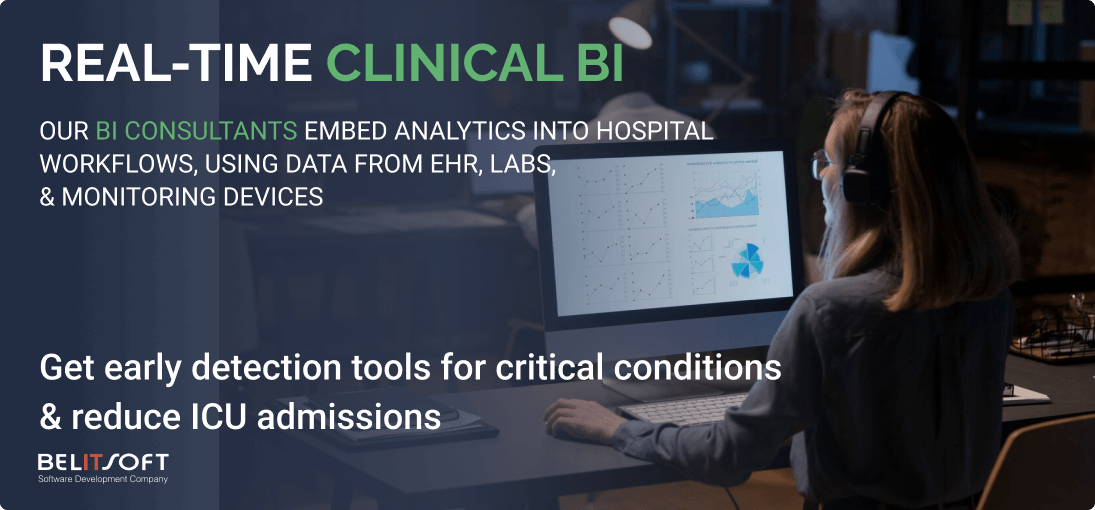
BI Use Case #2: Operational Efficiency
BI consultants deliver performance insights on:
- Bed occupancy forecasting
- Nurse shift utilization
- Equipment downtime
- Patient flow bottlenecks
Cleveland Clinic’s deployment of BI tools across operations is a gold standard: digitized workflows, integrated scheduling, and real-time resource tracking. The result? Fewer delays, less waste, better care.
BI Use Case #3: Financial Visibility
Healthcare finance is about seeing where revenue leaks, cost creeps, and margins disappear.
BI dashboards surface:
- Revenue by service line
- Payer mix trends
- Length of stay vs. cost curves
- Denial rates and root causes
The smartest CFOs use BI to answer questions faster:
- “Which DRG categories are underwater?”
- “Where are we losing revenue cycle velocity?”
- “How does staffing level affect case cost?”
BI consultants don’t just help you measure the cost of care - they help you redesign it.
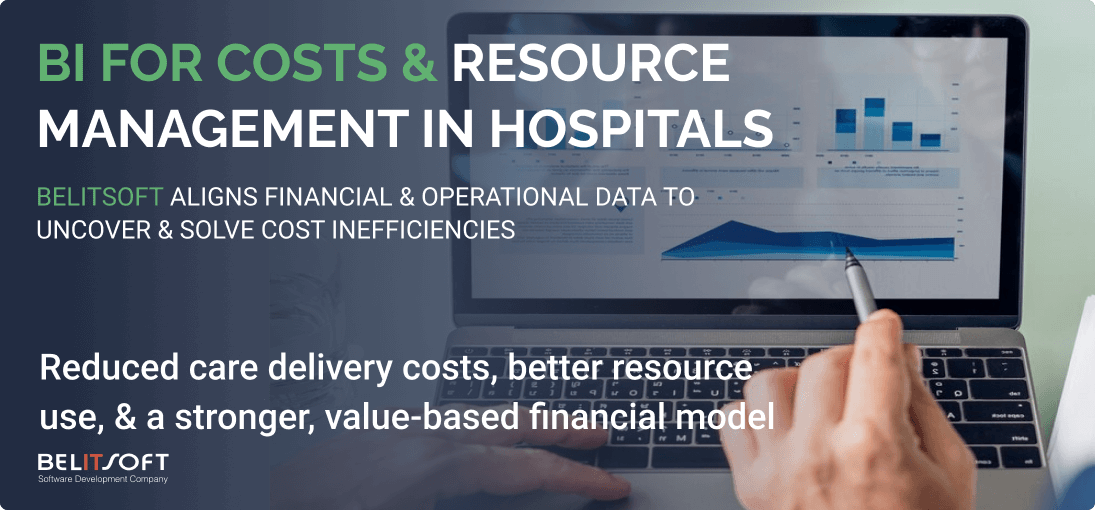
BI Use Case #4: Compliance
Healthcare is among the most regulated industries in the U.S. CMS, HIPAA, HEDIS, Joint Commission - the acronyms just keep coming.
BI makes compliance predictable:
- Automated reporting to regulators
- Real-time privacy monitoring (unusual EHR access, etc.)
- Flags for missing documentation before audits occur
Instead of scrambling when auditors arrive, hospitals with strong BI systems are already prepared, and logged.
And when privacy breaches or billing errors are caught early? That’s BI saving reputation, not just revenue.
Every large hospital system in the U.S. is now actively building analytics teams. The demand isn’t for domain-specific BI consultants who can work across:
- Epic/Cerner data models
- Claims systems
- Operational data from ERP and HR platforms
HIPAA-aligned reporting frameworks
In competitive health markets - especially value-based care regions - BI has shifted from innovation to necessity.
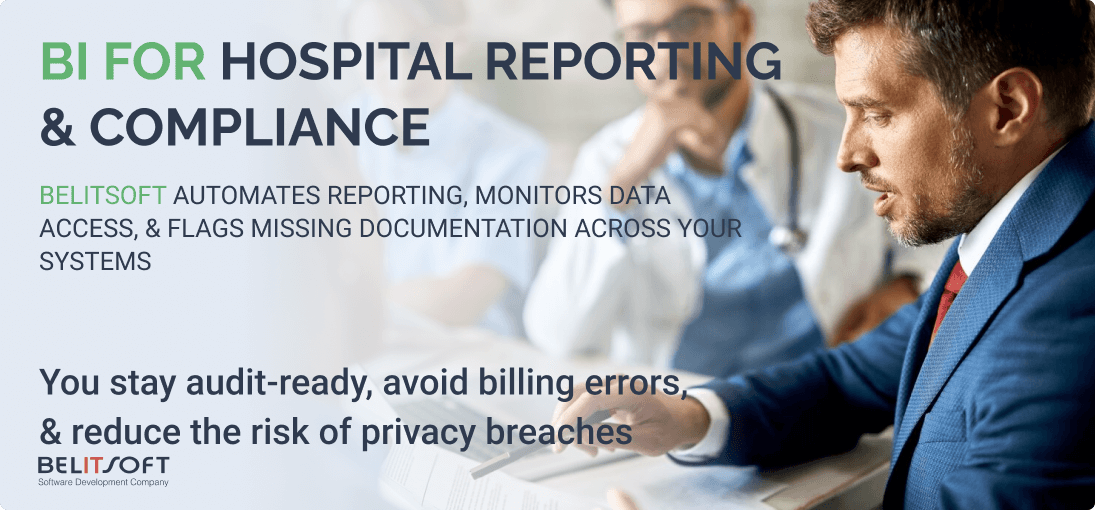
Health Insurance Companies (Payers)
Health insurers are becoming population health platforms, fraud monitors, and consumer engagement engines. The companies winning in 2025 are the ones with the sharpest visibility into cost, risk, and value.
BI Use Case #1: Controlling Spend
Healthcare costs are still rising. Wasteful utilization, unoptimized provider networks, and uncontrolled chronic conditions erode profitability daily. BI consultants are how insurers fight back with math.
BI teams analyze:
- Claims by cost driver, region, provider, or condition
- Patterns of overutilization (unnecessary imaging or ER visits, etc.)
- Projected future costs based on comorbidities, age, lifestyle, and geography
When payers automate utilization management with BI, they flag the wrong services earlier.
BI gives insurers the data to negotiate smarter contracts, with hard numbers behind every rate and benchmark. In a value-based care world, data is leverage.
BI Use Case #2: Population Health
The old model: react to illness, reimburse care. The new model: predict illness, prevent cost. BI is the bridge.
Predictive analytics built by BI consultants can:
- Flag patients likely to be hospitalized within 12 months
- Identify populations trending toward costly conditions like diabetes or COPD
- Pinpoint care gaps by geography, provider, or demographic
CMS star ratings, HEDIS scores, and ACA quality metrics are tied directly to financial performance and reimbursement.
If your health plan can intervene early via a wellness campaign, a care manager phone call, or a targeted benefit - you lower spending and boost quality ratings. That’s margin expansion and market differentiation, powered by BI.
BI Use Case #3: Fraud and Abuse
In insurance, the fraud may be a pattern that looks plausible until you zoom out. That’s BI’s job.
Advanced BI systems monitor:
- High-volume billers across time
- Duplicate or inflated claims
- Time-based logic (overlapping surgeries or implausible procedure schedules, etc.)
- Member usage anomalies
Machine learning layered on top of BI platforms can score provider and member risk in real time - before the payout. Prevention beats recovery. This kind of proactive BI is both ROI-positive and a compliance win.
BI Use Case #4: Personalization at Scale
If your member experience still feels like a call center and a paper EOB, you’re going to lose to the next generation of digital-native plans. BI enables:
- Member segmentation based on health profile, engagement level, and benefit usage
- Targeted outreach for condition management, preventive screenings, and plan upgrades
- Product development tuned to real market needs (virtual care bundles for high-utilizers, etc.)
Cigna’s “Health Advisor” wellness program is a perfect example. By mining member data, they identified who would benefit most from a health coach, prioritized outreach, and tracked the ROI in both satisfaction and downstream cost.
This is retention science.
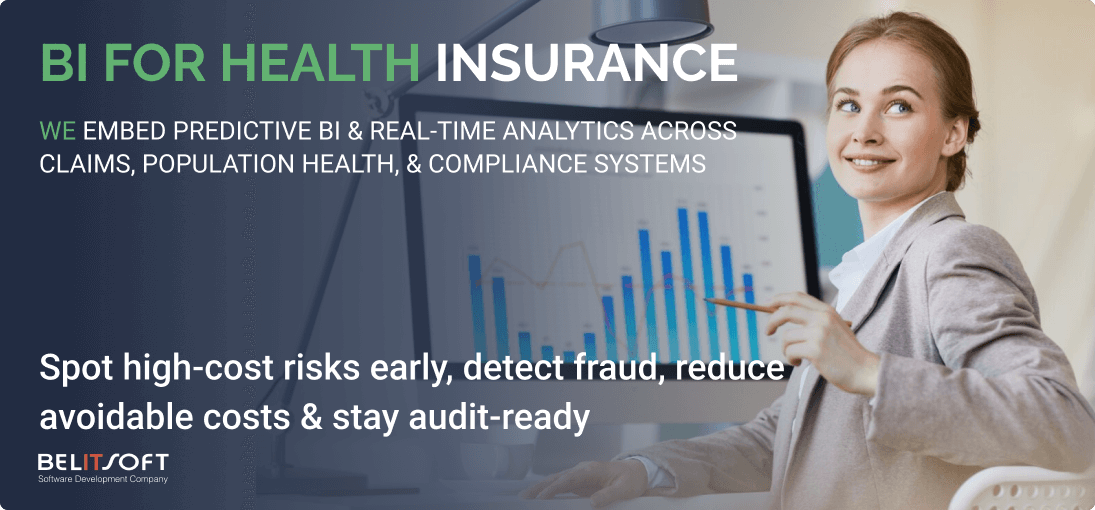
BI Use Case #5: Compliance
Star ratings, provider coverage, claims processing speed, and complaint handling - all of these reporting requirements need reliable, timely data.
BI platforms automate:
- HEDIS and CMS measure tracking
- Denial rate reporting
- Claims aging and resolution summaries
- Audit logs and escalation flags
BI lets you monitor your service quality in real time - from call center abandonment rates to claims processing times. That means you’re always audit-ready.
Pharmaceutical and Life Sciences Companies
Drug discovery, market strategy, regulatory compliance - every function now runs better with BI.
Drug R&D: Turning Years into Quarters
The cost of bringing a new drug to market still sits north of $1B. A lot of drugs still fail during development. BI helps by finding issues early and helping teams fix them faster.
BI consultants in R&D work across:
- Clinical trial design - optimizing protocols using historical outcome data
- Real-time monitoring - spotting drop-off in recruitment or adverse events
- Trial performance analytics - comparing site efficacy, patient adherence, safety flags
When Novartis invested in data lake infrastructure for its R&D arm, the intent was faster iteration. BI makes it possible to adapt trial strategy while the trial is still in motion - saving time, dollars, and reputational risk.
The result? Drugs move through phases with fewer surprises, and fewer delays.
Manufacturing and Supply Chain
When Pfizer partnered with AWS to deploy ML-powered BI tools on the factory floor, they were solving a problem: batch variability and quality control.
BI systems help pharma manufacturers:
- Detect anomalies on the line - before defective batches are produced
- Optimize yield and machine uptime
- Forecast demand across global markets - and match production accordingly
- Monitor environmental data for compliance
In an industry where a delay can derail national drug supply - or a single contaminated batch can trigger regulatory audits - BI is the difference between proactive control and expensive overreaction.
At Merck, analytics-driven supply chain oversight improved on-time delivery rates and lowered operational overhead. BI helped operations and protected revenue.
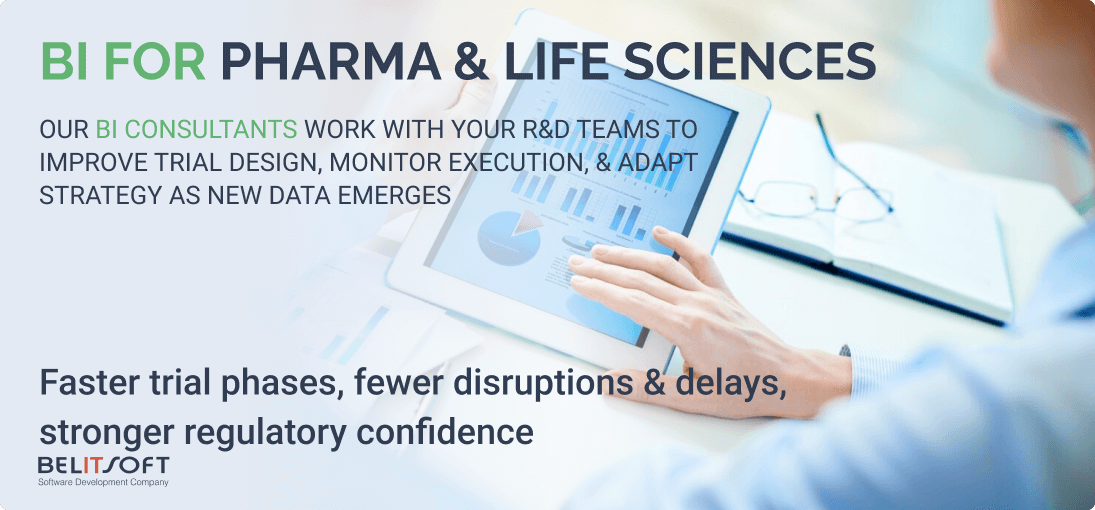
Commercial Strategy: Selling Smarter, Not Just More
Pharma commercial teams are flooded with data — provider behavior, prescription trends, demographic shifts, campaign attribution.
BI consultants in commercial roles help answer:
- Which physicians are influencing prescribing trends in target geographies?
- What’s the ROI of our current drug marketing mix — by channel?
- Where is sales force activity misaligned with actual demand?
Better BI enables precision sales:
- Tailored messaging by provider segment
- Optimized territory assignments
- Dynamic targeting based on real-time prescription activity
BI isn't just showing where your sales are happening but where they should be.
Compliance and Pharmacovigilance: BI Keeps You Out of the News
In life sciences, regulatory risk is existential. FDA holds, label changes, or missed reporting deadlines can mean millions lost and years set back.
BI platforms protect the enterprise by:
- Automating trial protocol compliance checks
- Surfacing adverse event trends post-launch
- Preparing standardized regulatory filings faster and with more accuracy
- Flagging quality issues before inspections
Pharmacovigilance teams rely on BI to monitor global reports in real-time.
And from a governance standpoint, BI provides traceability and audit readiness - so when regulators ask “what did you know and when,” your team has the answer.
Whether you're in drug discovery, clinical operations, manufacturing, or commercial, BI consultants are now embedded as strategic resources:
- Clinical data analysts supporting R&D velocity
- Supply chain BI architects driving predictive operations
- Market intelligence teams guiding brand launches and lifecycle management
- Compliance BI engineers ensuring regulatory readiness 24/7
Johnson & Johnson’s MedTech division hiring a Principal BI Consultant isn’t a one-off. BI is moving up the organization chart - into strategic planning, innovation councils, and executive dashboards.
HealthTech Startups and Digital Health Companies
HealthTech startups - ranging from digital health app makers and telemedicine providers to healthcare AI and analytics platforms - are another major source of demand for BI consultants.
BI Is the Feedback Loop Between Product and Patient Outcomes
Most healthtech startups position themselves as outcomes-focused. You’re improving chronic care. Streamlining provider workflows. Reducing ER visits. But unless you can measure that impact, you’re just another well-designed app in a crowded App Store.
BI gives you the feedback loop you need:
- Are patients using the tool as intended?
- Are outcomes improving across cohorts?
- Which features correlate with better results?
A diabetes management platform, for example, is judged by changes in A1C, hospitalization rates, and care plan adherence. BI consultants build the dashboards that track those KPIs across thousands of users - and let your team iterate based on real impact.
That’s what investors and enterprise customers expect in 2025: a line from product to health improvement, backed by live data.
Startups live or die by resource efficiency. BI helps you:
- Identify your lowest CAC channels - and double down
- Monitor churn risk signals- and course-correct proactively
- Optimize clinician staffing - based on usage patterns and service bottlenecks
Without these insights, you’re wasting ad dollars, burning cash on underused features, and missing key UX flaws.
With BI in place? You’re making precision decisions: which A/B variant to ship, which referral program drives LTV, which user cohort needs a re-engagement campaign next week.
Investors Don't Fund Claims
BI is how you tell your story in numbers - not just in vision decks. Every enterprise client and every investor in healthcare asks: Does it work? Show me the data. Whether it’s:
- A 22% drop in readmissions
- A 14-day reduction in average diagnosis cycle
- A 3x increase in therapy adherence
You can’t make those claims without BI capturing, validating, and packaging the evidence. And when those metrics show up in dashboards you can demo live? You’re selling proof at scale.
Startups that don’t build this layer early either find themselves retrofitting analytics under pressure - which is always more expensive and less convincing.
Even pre-Series A startups are hiring BI consultants as fractional experts to get dashboards running, define KPIs, and structure the first data pipelines.
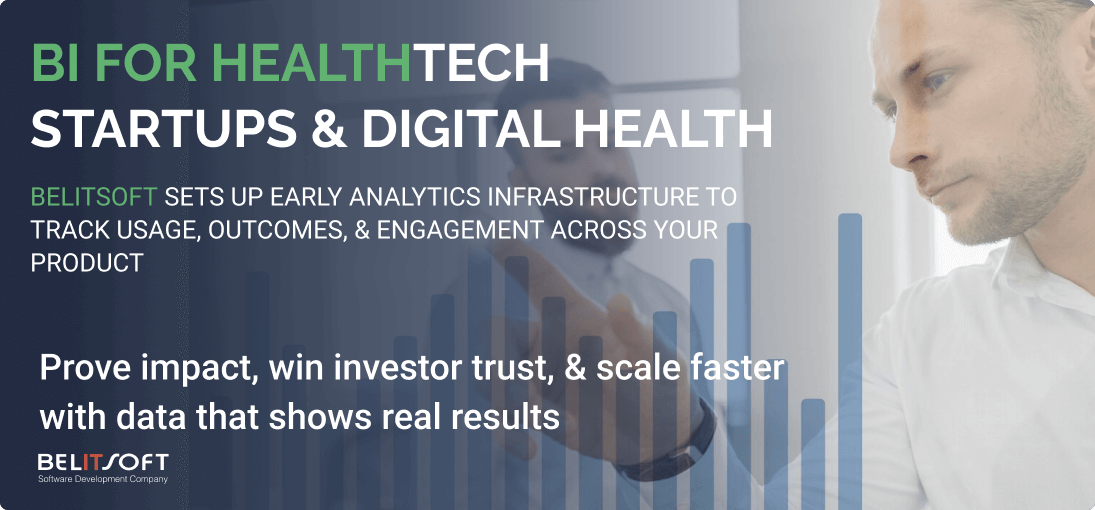
BI-Driven Startups Are the Product
Some of the most successful startups in healthtech are analytics-first. Think:
- Komodo Health — turning national-level healthcare data into predictive signals
- Innovaccer — creating infrastructure for value-based care through real-time insights
- Clarify Health — offering BI tooling directly to providers and payers
These companies don’t just use BI. They sell it.
They hire BI consultants as product engineers. As client success partners. As platform architects. If your company plays in AI, clinical decision support, or population health intelligence — your entire roadmap is tied to the quality and flexibility of your BI foundation.
Every funded healthtech startup is hiring BI roles right now - not just engineers, butthinkers who know healthcare workflows, regulatory nuance, and go-to-market data strategy.
Why?
- Because they need to track usage and engagement in week one.
- Because they need to launch with compliance and reporting infrastructure already running.
- Because they need evidence of value before the next raise, not after.
Founders that prioritize BI staffing now? They move faster.
How Belitsoft Can Help
Belitsoft helps healthcare organizations turn raw data into strategic decisions - by combining deep BI expertise with custom software development. Whether you're a hospital modernizing operations, a payer optimizing cost and risk, a pharma company running trials, or a healthtech startup proving impact - Belitsoft builds the tools that make your data work.
What Belitsoft Can Offer Across Healthcare Sectors
Hospitals and Health Systems
Belitsoft can deliver:
- Custom BI dashboards for clinical staff, COOs, and risk managers, using EHR, pharmacy, lab, and device data.
- Real-time alert systems for events like sepsis risk, readmission, discharge delays.
- Predictive analytics for staffing optimization, patient flow, and equipment uptime.
- Integration services for Epic, Cerner, and other hospital systems into centralized BI platforms.
- Financial BI modules: denial tracking, DRG profitability, length of stay vs cost curves.
As a custom development firm, Belitsoft can also build tailored modules on top of existing hospital IT infrastructure (augmenting BI in existing Cerner/Epic stacks with custom visualization or alerting tools, etc.).
Health Insurance Companies (Payers)
Belitsoft can offer:
- BI dashboards for claims analysis, population health trends, overutilization, and risk scoring.
- ML-assisted fraud detection tools (detecting anomalies, overlapping claims, inflated codes).
- HEDIS, CMS, and ACA reporting automation.
- Custom data pipelines that consolidate member engagement, claims, and provider behavior into one analytics layer.
- Member segmentation engines for targeted outreach, retention campaigns, and benefit design.
Belitsoft’s strength is in stitching together data from disparate sources - legacy systems, call centers, digital tools - into one coherent BI engine.
Pharmaceutical and Life Sciences Companies
Belitsoft can provide:
- Trial analytics platforms: real-time monitoring, protocol optimization, patient adherence tracking.
- BI dashboards for manufacturing: predictive quality control, batch anomaly detection, equipment performance, supply chain forecasting.
- Commercial analytics systems: provider-level prescribing behavior, marketing attribution, sales team alignment.
- Compliance monitoring tools: tracking adverse events, trial deviations, and filing readiness.
- Data lake architecture & integration to support high-scale, multi-source analytics across R&D, supply chain, and commercial divisions.
If a pharma company needs a Looker-like system with specific regulatory rules or integration with AWS/Microsoft stacks, Belitsoft can custom-build it.
HealthTech Startups & Digital Health
Belitsoft can support with:
- Early-stage BI architecture: setting up dashboards, defining KPIs, building pipelines for product/clinical/outcome tracking.
- Engagement and retention analytics for SaaS platforms (telemedicine, chronic care apps, etc.).
- Custom modules for A/B testing impact, clinician utilization, UX bottlenecks, re-engagement triggers.
- Real-time outcomes monitoring (A1C drops, diagnosis cycle time, readmission rates, etc.).
- Embedded analytics in client-facing tools (providers, payers) - product-grade BI.
For data-first startups (like Innovaccer or Komodo), Belitsoft can serve as an outsourced product analytics team - building BI tools not just for internal use, but as part of the actual product offering.
Rate this article
Recommended posts
Portfolio
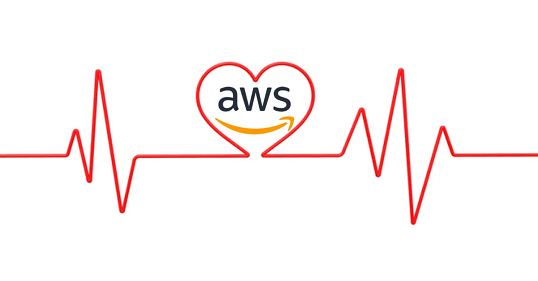
Our Clients' Feedback


















.jpg)
.jpg)
.jpg)
.jpg)
.jpg)
.jpg)
.jpg)
.jpg)
.jpg)
.jpg)
















We have been working for over 10 years and they have become our long-term technology partner. Any software development, programming, or design needs we have had, Belitsoft company has always been able to handle this for us.
Founder from ZensAI (Microsoft)/ formerly Elearningforce